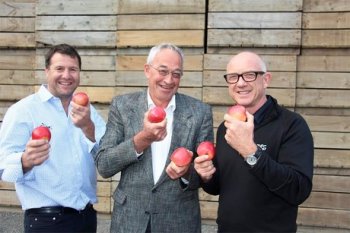
Pipfruit New Zealand’s new directors, Cameron Taylor, Bruce Beaton and Peter Beaven, who was re-elected for another term, said the industry cannot reach its record breaking potential unless it attracts hundreds more people to join them.
New Zealand grows some of the best apples and pears in the world, and over the coming five seasons will grow hundreds of great jobs offering promising futures and career opportunities, they said.
Now ahead of forecast to becoming a billion dollar export business by 2020, production will increase by 30 per cent in five years and will need 4,000 permanent and seasonal jobs to harvest, market, and export the crop to more than 70 international markets.
“But we can’t get there on our own. To achieve our record breaking potential we must help attract and develop a skilled labour force and grow capability and skills both within the current, and future workforce,” Beaton said.
Pipfruit New Zealand reported that it is undertaking a major work project which includes developing an interactive tool that will identify and track all the new and different jobs available when they are coming on stream and their value, along with the qualifications, skills and experience required to match them. This industry-led tool should provide a real pathway for people wanting to learn and find out more about new opportunities available now and in the future and how to prepare for and gain employment.
Taylor said it was critical to engage and find new ways to encourage young minds to start thinking about the wide range of jobs on offer to climb the career ladder. “Enter our industry and you can go places – that’s the message we want to send out to encourage, inspire and see more people succeed.”
Beaven said four back-to-back years of making money had allowed growers to reduce debt and reinvest which has seen huge development, expansion and annual planting of over a million new trees.
The industry had evolved and matured into a fully integrated business structure that has seen real collaboration and better communication, while remaining fiercely competitive, Beaton said. “While the industry has gone through significant turmoil and change to achieve this, we are now far stronger and as a country we are in better shape than any of our competitors.”
Taylor said a great example of the collaboration was how the industry had now forged stronger working relationships with the Ministry of Primary Industries and the Ministry of Foreign Affairs and Trade. “This is a real strength to our bow as we continue to improve market access and fiercely protect our borders from the risk of pests and disease, which could destroy our entire industry overnight.”



 Classifieds
Classifieds

